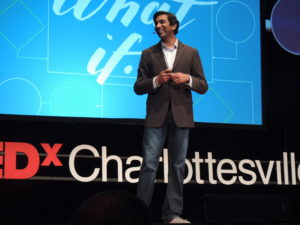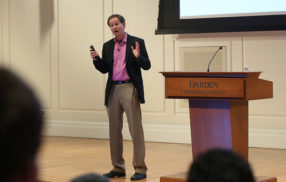
Can Businesses Save the Planet? Yes or No, Their Customers Expect Them to Try
By Dave Hendrick
The world is expecting more and more from business.
BlackRock CEO Larry Fink caused a stir in early 2018 when he issued a letter to the CEOs of companies in which BlackRock invests. In it, he explicitly called on companies to disclose long-term strategies for how they will make a positive contribution to society.
“Without a sense of purpose, no company, either public or private, can achieve its full potential. It will ultimately lose the license to operate from key stakeholders,” Fink wrote. “Our clients — who are your company’s owners — are asking you to demonstrate the leadership and clarity that will drive not only their own investment returns, but also the prosperity and security of their fellow citizens.”
The Coca-Cola Co. Chairman Muhtar Kent spoke at Darden last year and proclaimed that it used to be sufficient for the one-time soda company to simply sell refreshing beverages that tasted great, but not anymore. Consumers and — just as importantly — employees want more.
The relationship between companies and their consumers, employees and investors is growing more complicated.
The late University of Virginia Darden School of Business Professor James Rubin and Batten Institute for Entrepreneurship and Innovation Fellow Barie Carmichael wrote in their 2017 book Reset: Business and Society in the New Social Landscape that there’s a fundamental shift underway; a “widening gap between the public’s long-eroding trust in business and their growing expectations for business to make positive contributions to society.”
Far from being caught behind the curve, the Darden School and its faculty are generating new ideas to propel business to meet society’s expectation that it bring forth solutions to the world’s most pressing challenges.
These new ideas are anything but shy of aspiration: managing the world’s fresh water supply, innovating to reduce the amount of carbon released into the atmosphere, and creating a world in which companies are incentivized to take care of all stakeholders for the long term.
Why do Darden professors aim so high? Because progress begins with a single thought.
The Thought: Innovating to Avert a Climate Change Disaster

Darden Chief Strategy Officer Mike Lenox
Darden Professor Mike Lenox had an “aha” moment about business and climate change when watching the bailout of General Motors during the depths of the financial crisis in 2008.
Putting aside the various economic and human reasons why it might make sense to ensure the continued viability of General Motors, Lenox was struck by the bailout provisions intended to position the company toward a more energy-efficient, greener future.
“A lightbulb went off, and I realized we were thinking about environmental issues all wrong,” said Lenox, who also serves as Darden’s senior associate dean and chief strategy officer. “The solution to our environmental challenge isn’t about getting General Motors to be more green. To address sustainability, we need innovators and entrepreneurs to put them out of business. We need more Teslas.”
That provocative contention lies at the heart of Lenox’s new book, co-written with Duke Fuqua School Professor Aaron Chatterji, Can Business Save the Earth?: Innovating Our Way to Sustainability (Stanford University Press, May 2018).
Lenox’s definition of a sustainable future is pinned to the Intergovernmental Panel on Climate Change’s calculations on the maximum amount of carbon that can be released into the atmosphere to avoid a rise in global temperature of 2 degrees Celsius or more — a level scientists agree would trigger dramatic environmental shifts that could harm economic activity and compromise human welfare.
Given the continued population growth and industrialization of the developing world, “the simple bromides of ‘reduce, reuse, recycle,’ or ‘buy green’ aren’t getting the job done in the current world,” Lenox said. “The question becomes how do we motivate our innovation engine to generate the technologies and businesses that can help address some of these challenges and issues? Business will not do this on its own. It is the system as a whole that matters and needs to be catalyzed to drive innovation.”
As an example, Lenox highlights the innovation system that helped produce Tesla, the clean energy company most known for its electric cars. The company is the result of an innovation-friendly system supported by a series of investors including, at one point, the U.S. Department of Energy; a bevy of electric vehicle-backing nonprofit organizations; and consumers, who took to the sporty and tech-centric Tesla.
If business is the leading edge of a human endeavor to save the earth, enterprises will need to be led by more visionary leaders who can catalyze radical disruption and tap the innovation engine to make the plans a reality. Government and other stakeholders will need to take actions to allow innovation systems to thrive.
“We all have the power, in one way or another, to serve as a catalyst,” Lenox writes in the book. “The question before us, all of us, is whether we will take the actions today to create the conditions under which the innovation system can thrive. The fate of our planet depends on it.”
The Thought: Ending the ‘Fishing With Dynamite’ Mentality of Short-Term Profit-Seeking

Darden Professor Bobby Parmar
Like many of his colleagues, Professor Bobby Parmar has long held an interest in pushing ideas about the purpose of business beyond the walls of academia.
It was at a Darden-hosted stakeholder theory conference in 2014 — the Darden School has long been fertile ground for such research due to the pioneering work of Professor Ed Freeman, the Olsson Center for Applied Ethics and the Institute for Business in Society — that Parmar decided to orient a greater portion of his research toward a wider audience.
“This topic is so important, we shouldn’t be speaking only to academics,” Parmar said. “So in addition to the research that we do in journals, it’s important to take these topics and translate them in a fashion that a mainstream audience can engage with.”
One idea Parmar and his colleagues came up with: a feature film to explore the role and purpose of business, and why it should matter to an informed populace.
Working with Academy Award-winning filmmaker Paul Wagner, Parmar has helped produce Fishing With Dynamite, a feature-length documentary juxtaposing stakeholder and shareholder theories, featuring profiles of companies embracing the stakeholder mindset and including interviews with employees, consumers, executives and academics. The title derives from the illegal practice of blast fishing, which is an easy and efficient way to fish that also destroys the surrounding habitat supporting the fish.
The interviews reveal the degree to which executives want to run their businesses for the benefit of a broad suite of stakeholders, but feel pressure to show short-term gains.
“I was surprised by how much CEOs felt like they wanted to take care of their stakeholders and be responsible members of their communities and how hampered they felt by financial markets,” Parmar said.
Parmar said the film explores a number of novel tactics that could discourage an overriding adherence to financial markets. One such example: the Long-Term Stock Exchange, a startup national securities exchange aimed at companies focused on innovation through long-term thinking.
Parmar said the film’s interests are less about seeking a single solution, but rather amplifying the stakes and costs for the world when businesses appear increasingly incentivized toward treating shareholders as their primary clients.
While far from declaring victory, Parmar said it was encouraging to see the false dichotomy of the shareholders versus stakeholders debate dissolve into a more nuanced, fact-based conversation.
“You may see more shareholders say, ‘Look, by taking care of other stakeholders and by being a responsible member of the community and by having a clear purpose, you are benefiting shareholders,’” Parmar said. “More companies are seeing the importance of defining their purpose and having a purpose that goes beyond profits.”
Parmar and the video team are in post-production work for Fishing With Dynamite, and eyeing a fall 2018 release.
The Thought: Keeping Fresh Water Clean and Accessible

Darden Professor Peter Debaere, executive director of the UVA Global Water Initiative.
Managing the world’s fresh water is one the great challenges of the 21st century.
Academic research and study in the sector typically focus on engineering or environmental challenges, but the Global Water Initiative — spearheaded by Darden Professor Peter Debaere and hosted by Darden — takes a more holistic approach to the vital resource.
The water initiative, which launched a website and blog this spring shortly before its fifth annual World Water Series, unites more than 25 faculty members from across the University of Virginia and beyond in environmental sciences, engineering, architecture, history, law, business, economics, public policy, medicine and more who have already been hard at work on global water issues. Their research and projects seek to solve issues as broad as ending local water emergencies in the driest parts of the world through proper allocation; stemming pollution and preserving surrounding ecosystems so that waterways stay clean and healthy; and improving antiquated water delivery systems that rely on vulnerable women and children for water collection, limiting their prospects to get an education or earn an income.
Faculty members within the Global Water Initiative want to infuse every project with knowledge from every discipline that touches the complex issue of water. In doing so, they will be able to share findings that connect important dots with the broader public, including policymakers, and help public and private organizations achieve solutions. They will be able to better arm students with the knowledge to become leaders in the field.
Though the problems are complex, Debaere believes groups like this one can make a lot of progress.
“Water issues are among the biggest challenges we face,” Debaere said. “But I also believe they are manageable problems. … We know what some of the solutions are, and we know we can implement them at a local level.”
Debaere brings a business and economics perspective, with research focusing on water markets — how the right to use water can be traded among farmers, water utilities and businesses. Such markets are potentially a vital tool to address water scarcity.
Debaere said that businesses and business leaders are increasingly interested in taking on broader social and environmental problems like water scarcity.
“Water is a very sensitive topic, and people expect businesses to behave responsibly with it,” he said. “I especially see this among our MBA students. The younger generation is very interested in doing business with broader social impact.”
Time will tell what role business will play in ensuring the continued viability of the earth, but as Lenox writes in the conclusion of his book, it’s clear it has to be part of the solution. Consumers expect it, and increasingly, meaningful words and deeds look like good business.
The University of Virginia Darden School of Business prepares responsible global leaders through unparalleled transformational learning experiences. Darden’s graduate degree programs (MBA, MSBA and Ph.D.) and Executive Education & Lifelong Learning programs offered by the Darden School Foundation set the stage for a lifetime of career advancement and impact. Darden’s top-ranked faculty, renowned for teaching excellence, inspires and shapes modern business leadership worldwide through research, thought leadership and business publishing. Darden has Grounds in Charlottesville, Virginia, and the Washington, D.C., area and a global community that includes 18,000 alumni in 90 countries. Darden was established in 1955 at the University of Virginia, a top public university founded by Thomas Jefferson in 1819 in Charlottesville, Virginia.
Press Contact
Molly Mitchell
Senior Associate Director, Editorial and Media Relations
Darden School of Business
University of Virginia
MitchellM@darden.virginia.edu







